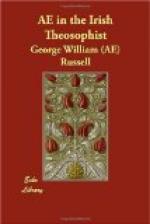Not alone did this opulence of spiritual life make him happy, another cause conspired with it to this end. He had met a nature somewhat akin to his own: Olive Rayne, the woman of his life.
As the days passed over he grew eager not to lose any chance of speech with her, and but two days before his departure he walked to the village hoping to see her. Down the quiet English lane in the evening he passed with the rapid feet that bear onward unquiet or feverish thought. The clear fresh air communicated delight to him; the fields grown dim, the voice of the cuckoo, the moon like a yellow globe cut in the blue, the cattle like great red shadows driven homeward with much unnecessary clamour by the children; all these flashed in upon him and became part of him: ready made accessories and backgrounds to his dreams, their quietness stilled and soothed the troubled beauty of passion. His pace lessened as he came near the village, half wondering what would serve as excuse for visits following one so soon upon the other. Chance served as excuse. He saw her grey dress, her firm upright figure coming out from among the lilac brushes at the gate of her father’s house. She saw Harvey coming towards her and waited for him with a pleasant smile. Harvey, accustomed to introspect and ideal imaginings, here encountered no shock gazing upon the external. Some last light of day reflected upward from the white gate-post, irradiated her face, and touched with gold the delicate brown hair, the nosrtils, lips, chin, and the lilac of her throat. Her features were clear-cut, flawless; the expression exquisitely grave and pure; the large grey eyes had that steady glow which shows a firm and undisturbed will. In some undefinable way he found himself thinking of the vague objects of his dreams, delicate and subtle things, dew, starlight, and transparencies rose up by some affinity. He rejected them—not those—then a strong warrior with a look of pity on his face appeared and disappeared: all this quick as a flash before she spoke.




